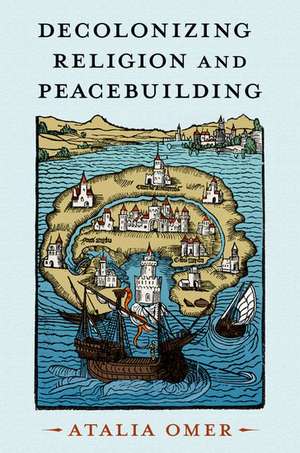Decolonizing Religion and Peacebuilding: STUDIES IN STRATEGIC PEACEBUILDING
Autor Atalia Omeren Limba Engleză Paperback – 7 sep 2023
Preț: 155.47 lei
Preț vechi: 178.11 lei
-13% Nou
Puncte Express: 233
Preț estimativ în valută:
29.76€ • 32.34$ • 25.01£
29.76€ • 32.34$ • 25.01£
Carte disponibilă
Livrare economică 20-26 martie
Livrare express 15-21 martie pentru 50.22 lei
Preluare comenzi: 021 569.72.76
Specificații
ISBN-13: 9780197683026
ISBN-10: 0197683029
Pagini: 304
Ilustrații: 14 b/w halftones
Dimensiuni: 236 x 157 x 18 mm
Greutate: 0.46 kg
Editura: Oxford University Press
Colecția OUP USA
Seria STUDIES IN STRATEGIC PEACEBUILDING
Locul publicării:New York, United States
ISBN-10: 0197683029
Pagini: 304
Ilustrații: 14 b/w halftones
Dimensiuni: 236 x 157 x 18 mm
Greutate: 0.46 kg
Editura: Oxford University Press
Colecția OUP USA
Seria STUDIES IN STRATEGIC PEACEBUILDING
Locul publicării:New York, United States
Recenzii
In Decolonizing Religion and Peacebuilding, Atalia Omer sounds a stunning and urgent call for us to recognize that current approaches to the integration and bureaucratization of religion in peacebuilding and development work can actually serve to denude religion of the prophetic impulse to justice, thereby reinscribing the very relations of power it seeks to disrupt. This book represents not only a significant academic advance in decolonial understandings of religion, but also a timely and powerfully counterintuitive warning to practitioners.
Atalia Omer is the expert on hermeneutical openings and closures as pathways and obstacles (respectively) to peace. This important and powerful book, by zeroing in on the closures of the 'harmony business,' shows us clearly what is at stake for peacebuilding in creating spaces that deepen religious 'knowing' across intersectional registers.
In this brilliant, multilayered exploration of religious peacebuilding ventures in Kenya and the Philippines, Omer employs decolonial, queer, and feminist theories to expose and critique the religious peacebuilding industry that often reifies colonial legacies that undermine just peacebuilding efforts. She skillfully challenges facile and uncritical acceptance of 'purity' tendencies within decolonial theory and what she calls the 'harmony business' of religious peacebuilding; both of which hinder versus enhance just peacebuilding efforts. Readers are left with a fresh understanding of how embracing complexity and contradiction can inspire creative and generative possibilities for just futures that are otherwise unimaginable when trapped within hermetically sealed epistemologies. Decolonial theorists and religious peacebuilders alike will be transformed and inspired by Omer's astute, timely, and innovative contribution.
Decolonizing Religion and Peacebuilding offers an irreplaceable gift to the scholarship and practice of building peace, and to people motivated by faith who seek the transformation of harm and violence. The gift is this: To understand that lasting change starts with honest, critical reflection. This type of engaged scholarship requires the courage to unravel the paradoxical challenge of how to appreciate the deep commitment of the faith-inspired practitioner navigating difficult settings of violence while unveiling the ubiquitous overlay of historic and contemporary patterns of religious colonial patterns that perpetuate dehumanization. With extensive interviews and extraordinary mastery of interdisciplinary literature, Atalia Omer has surfaced the deep conversation our fields of peacebuilding and religious studies have long needed.
Atalia Omer is the expert on hermeneutical openings and closures as pathways and obstacles (respectively) to peace. This important and powerful book, by zeroing in on the closures of the 'harmony business,' shows us clearly what is at stake for peacebuilding in creating spaces that deepen religious 'knowing' across intersectional registers.
In this brilliant, multilayered exploration of religious peacebuilding ventures in Kenya and the Philippines, Omer employs decolonial, queer, and feminist theories to expose and critique the religious peacebuilding industry that often reifies colonial legacies that undermine just peacebuilding efforts. She skillfully challenges facile and uncritical acceptance of 'purity' tendencies within decolonial theory and what she calls the 'harmony business' of religious peacebuilding; both of which hinder versus enhance just peacebuilding efforts. Readers are left with a fresh understanding of how embracing complexity and contradiction can inspire creative and generative possibilities for just futures that are otherwise unimaginable when trapped within hermetically sealed epistemologies. Decolonial theorists and religious peacebuilders alike will be transformed and inspired by Omer's astute, timely, and innovative contribution.
Decolonizing Religion and Peacebuilding offers an irreplaceable gift to the scholarship and practice of building peace, and to people motivated by faith who seek the transformation of harm and violence. The gift is this: To understand that lasting change starts with honest, critical reflection. This type of engaged scholarship requires the courage to unravel the paradoxical challenge of how to appreciate the deep commitment of the faith-inspired practitioner navigating difficult settings of violence while unveiling the ubiquitous overlay of historic and contemporary patterns of religious colonial patterns that perpetuate dehumanization. With extensive interviews and extraordinary mastery of interdisciplinary literature, Atalia Omer has surfaced the deep conversation our fields of peacebuilding and religious studies have long needed.
Notă biografică
Atalia Omer is a Professor of Religion, Conflict, and Peace Studies at the Kroc Institute for International Peace Studies and at the Keough School of Global Affairs at the University of Notre Dame in the United States. She is also the Dermot T.J. Dunphy Visiting Professor of Religion, Violence, and Peace Building at Harvard University and a senior fellow at the Religion, Conflict, and Peace Initiative at Harvard University's Religion and Public Life program. Omer was awarded an Andrew Carnegie Fellowship in 2017. Among other publications, Omer is the author of When Peace is Not Enough: How the Israeli Peace Camp Thinks about Religion, Nationalism, and Justice (2015) and Days of Awe: Reimagining Jewishness in Solidarity with Palestinians (2019). She is also a co-editor of The Oxford Handbook of Religion, Conflict, and Peacebuilding (Oxford, 2015).
